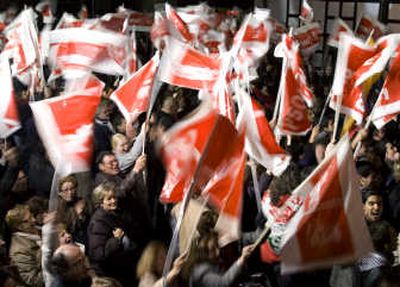Socialist prime minister wins second term in Spain

MADRID, Spain – Spain’s Socialist prime minister won re-election Sunday, as voters dismissed worries about a slumping economy, immigration and resurgent Basque militants to hand him a second term.
The results were a clear endorsement of Prime Minister Jose Luis Rodriguez Zapatero’s record, which includes reforms such as legalizing gay marriage and granting on-demand divorce, once thought unthinkable in this overwhelmingly Roman Catholic country.
Zapatero also withdrew Spanish troops from Iraq and launched a drive to cede more power to Spain’s semiautonomous regions.
“The Spanish people have spoken clearly and decided to start a new era,” Zapatero told supporters outside the party’s headquarters in Madrid. “I will govern with a firm but open hand.”
With 97 percent of the vote counted, Zapatero’s Socialist party had 43.7 percent, versus 40.1 percent for the conservative Popular Party, according to the Interior Ministry.
Opposition conservatives conceded defeat but took solace in the fact that they picked up more parliamentary seats than the Socialists. Both parties gained seats at the expense of smaller leftist and regional groups.
While Zapatero’s party picked up seats in the lower house, it fell short of a majority and will have to form an alliance with smaller regional parties to govern.
For Mariano Rajoy, Zapatero’s conservative rival both in Sunday’s vote and in the 2004 election, his second consecutive defeat will likely increase pressure on him to step down as party chief.
Sunday’s vote came two days after the killing of Socialist politician Isaias Carrasco at the hands of the Basque militant group ETA, which jolted Spaniards and prompted both parties to cancel final campaign appearances.
Some in Spain had predicted the killing might prompt a wave of sympathy and boost at the polls for Zapatero’s party, especially after Carrasco’s 20-year-old daughter Sandra made an emotional appeal Saturday for people to defy ETA by turning out en mass to vote.
The timing of the attack was reminiscent of an election-eve massacre by Islamic militants who killed 191 people in a string of bombings against commuter trains in Madrid on March 11, 2004.
Three days after that attack, Zapatero won a surprise victory amid a wave of voter outrage at the ruling conservatives, who blamed them on ETA even as evidence of Islamic involvement mounted. The tactics were widely seen as a bid to deflect perceptions that the killings were al-Qaida’s revenge for the government’s deeply unpopular support of the U.S.-led invasion of Iraq.
Many conservatives considered Zapatero’s 2004 victory a fluke, and saw Sunday’s vote as their chance to correct it. The prime minister’s victory was seen as finally giving him a legitimacy that critics say he has lacked.